Hidden Momo · Half Foot Garden Hotel
1 night
Rooms and Guests
1 room, 2 adults, 0 children
All Properties in Yangzhou
Hidden Momo · Half Foot Garden Hotel
Opened in 2025
No.2 Yingchun Lane, Guangling District, Yangzhou, Jiangsu, China
Show on Map
We Price Match
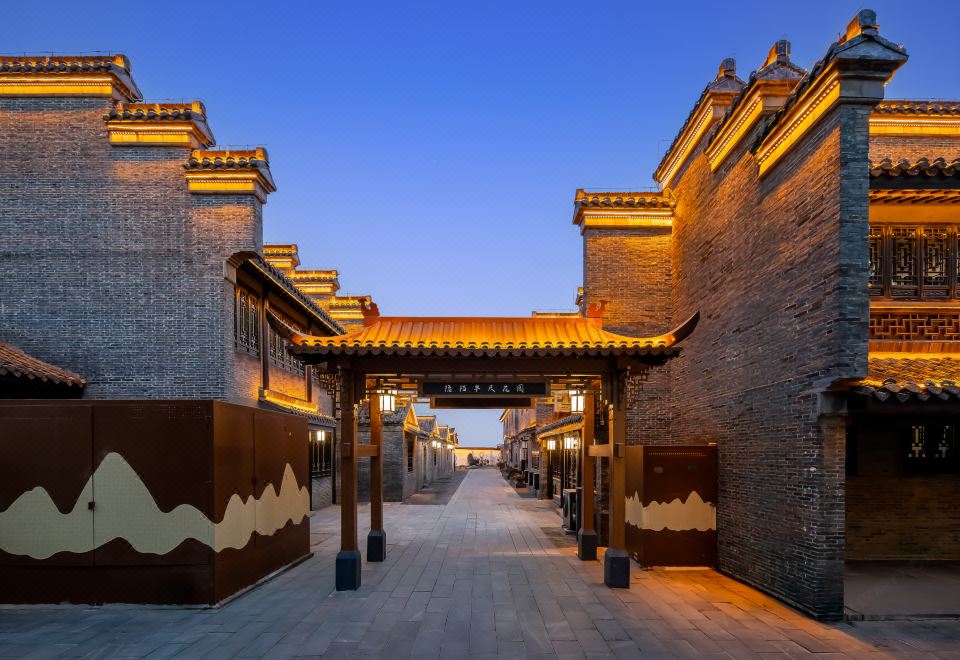
Last booked 28 mins ago
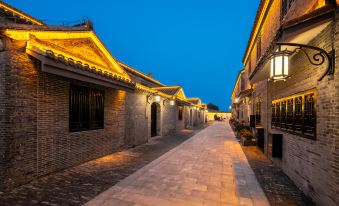
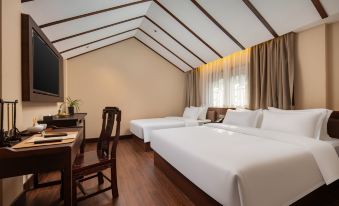

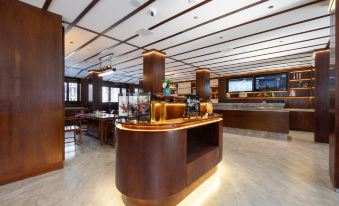


 Highlights
Highlights Newly renovated
Newly renovated Newly opened
Newly opened Varied breakfast
Varied breakfast Free parking
Free parking Pets welcome
Pets welcomeShow More
Amenities
Private parkingFree
EV charging station
24-hour front desk
Luggage storageFree
Library
Tea room
Cardroom
Restaurant
All Amenities
Property Description
Yinmo Yangzhou · Half-Arshen Garden Hotel: Encounter the Poetic Dwelling of Thousand-Year-Old Yangzhou
"Flowers bloom in March and the Yangtze River flows to Yangzhou." When the poetic charm of spring spreads along the canal, the Hidden Lane Half-Meter Garden Hotel invites you to step into a dream of Jiangnan that transcends time and space. The hotel is rooted in the historical and cultural district north of the Ruan Family Ancestral Hall on Yuxian Street in Guangling District, Yangzhou City. This place was once the residence of Ruan Yuan, a three-time Grand Secretary, a first-rank official, and the Viceroy of Liangjiang during the reigns of Emperors Qianlong, Jiaqing, and Daoguang of the Qing Dynasty.
In the Qing Dynasty's literary circle, there were not many people who could establish a school or a sect. Ruan Yuan from Jiangsu Province was one of them. Ruan Yuan's ancestral home was in Yizheng, Jiangsu Province. He was born in a family of officials in Yangzhou in the 29th year of Emperor Qianlong's reign. His grandfather was a military scholar and served as a general in Hunan. His father entered the imperial academy at a young age and studied "Zuo's Spring and Autumn Annals", becoming a master of classical prose. His mother, Lin, also came from an official family and was well-versed in poetry and literature, with good cultivation. Growing up in such a family, Ruan Yuan was influenced by his family's learning from an early age and gradually became a renowned talent in both literature and martial arts. At the age of 25, Ruan Yuan passed the imperial examination and entered the officialdom. Ruan Yuan not only held high positions but was also a staunch guardian of Yangzhou's culture. He compiled "Jingji Zanggu" and edited and printed "Thirteen Classics with Commentaries and Sub-commentaries", his cultural achievements shining like stars in Yangzhou's cultural heritage.
Mr. Ruan Yuan dedicated his life to cultural inheritance and academic research. The "Jingji Zanggu" he compiled collected the essence of ancient annotations and interpretations, providing an important basis for later generations to study classics. The "Thirteen Classics with Commentaries and Sub-commentaries" he edited and printed, with its rigorous academic attitude in correcting classics, became an important model for the study of classics. The "Huangqing Jingjie" he compiled and printed was a comprehensive collection of Qing Dynasty's research on classics. His academic philosophy of "seeking truth from facts and not believing without evidence" not only influenced the academic atmosphere of an era but also became a shining spiritual treasure in the Chinese cultural heritage.
When children step into this hotel filled with historical charm, every brick under their feet and every painting on the walls tell stories of the past. Wandering through the ancient corridors, gently touching the carved window lattices, they can almost see Ruan Yuan's figure writing at his desk. Standing in front of the pavilions and terraces in the courtyard, feeling the elegance of the blue tiles and horse-head walls, the aesthetic genes of traditional culture are quietly integrated into their cognition.
The hotel has carefully designed nearly a hundred guest rooms, retaining the charm of ancient architecture while integrating intelligent technology. Double-layer vacuum glass windows block out the noise, and voice assistants and electric curtains create a comfortable and convenient living environment for children. The hotel's garden-like design, with its well-arranged pavilions and lush greenery, is a natural classroom for children to explore nature and stimulate their imagination. Here, children can listen to the birds singing in the morning, observe the growth of plants, and gaze at the stars at night, feeling the vastness of the universe. In this way, they develop a love for nature and an exploratory spirit unconsciously.
In addition, the hotel's superior location provides convenience for children's cultural studies. The Renfengli Ancient Street to the east, with its thousand-year-old market life and intangible cultural heritage skills, the nearby Wenchang Pavilion and Siwang Pavilion, which carry the city's memories, and the scenic spots such as Slender West Lake, He Garden, and Ge Garden within a 10-minute drive, perfectly blend the exquisite elegance of Jiangnan gardens with historical stories. Parents can take their children to visit these cultural sites along Ruan Yuan's footsteps, taste traditional delicacies in Dongguan Ancient Street, learn about commercial civilization in salt merchant residences, and appreciate the wisdom of ancient garden design in the gardens, making the knowledge in textbooks come alive.
When young entrepreneurs and professionals step into this renovated ancestral home hotel, it's as if they have traveled through time to have a spiritual dialogue with this great man. The 11 independent ancient-style courtyards, with their black tiles and grey walls, exude the weight of history. The carved beams and painted pillars are engraved with the accumulation of culture. Wandering through them, the overhanging eaves and brackets above seem to reflect Ruan Yuan's broad vision; the winding corridors and paths beneath are like his wisdom in navigating complex situations.
Each guest room in the hotel seamlessly blends traditional aesthetics with modern intelligence. Double-layer vacuum glass windows insulate you from the outside world, creating a quiet space for reflection; the entire house is equipped with smart devices, from voice assistants to smart bathrooms, empowering an efficient lifestyle with technology. And when you open the window, the pavilions, waterside terraces, blooming flowers and lush trees in the courtyard instantly transport you back to the era of scholars and literati discussing poetry and philosophy, allowing you to find a peaceful haven for your soul on the bustling path of striving, and gain clarity on your career direction through contemplation.
The hotel's prime location offers a fertile ground for inspiration and creativity among the younger generation of strivers. To the east lies the bustling Renfengli Ancient Street, where traditional craftsmanship and modern creativity blend harmoniously. To the west is the bustling Wenchang Baihui, where commercial vitality and cultural heritage complement each other. Historical landmarks such as Wenchang Pavilion and Siwangting, within walking distance, bear witness to the thousand-year-old rise and fall of Yangzhou. Within a 10-minute drive are the Slender West Lake, He Garden, and Ge Garden, showcasing the ingenious garden-making wisdom and life philosophy of the ancients. These cultural treasures are like mirrors, reflecting the boundless possibilities of innovative thinking and inspiring you to break conventions and innovate in your career development.
Living in the former residence of Ruan Yuan, you will be immersed in the atmospher
Show More
9.0/10
GoodCleanliness9.1
Amenities8.9
Location9.0
Service9.1
All 189 Reviews
Surroundings
Airport: Yangzhou Taizhou Airport
(40.3 km)
Airport: Zhenjiang Dalu General Airport
(64.2 km)
Train: Yangzhou Railway Station
(8.3 km)
Train: Yangzhoudong Railway Station
(11.0 km)
Landmarks: Wenchang Pavilion
(360m)
Landmarks: Zhenyuan Garden
(420m)
View on Map
Overview
Rooms
Guest Reviews
Services & Amenities
Policies

4
Deluxe 2-bed Room
2 Single bed
20-25m² | Floor: 1-2
Has window
Free Wi-Fi
Air conditioning
Private bathroom
TV
Daily housekeeping
Check Availability

4
Si Shui Gui Tang Deluxe Family Room
1 Single bed and 1 Queen bed
26-30m² | Floor: 1-2
Has window
Free Wi-Fi
Air conditioning
Private bathroom
TV
Daily housekeeping
Check Availability

4
Guestroom - 5-Bedroom
Bedroom 1:1 Queen bed and 1 Single bed ● Bedroom 2:1 Queen bed and 1 Single bed ● Bedroom 3:2 Single bed ● Bedroom 4:1 Queen bed ● Bedroom 5:1 King bed
25-35m² | Floor: 1
Has window
Free Wi-Fi
Non-smoking
Air conditioning
Private bathroom
TV
Daily housekeeping
Check Availability

4
Double Room A
1 Queen bed
18-20m² | Floor: 1-2
Has window
Free Wi-Fi
Air conditioning
Private bathroom
TV
Daily housekeeping
Check Availability

4
Guestroom (Cards)
1 King bed
35-38m² | Floor: 1-2
Has window
Free Wi-Fi
Air conditioning
Private bathroom
TV
Daily housekeeping
Check Availability

4
Deluxe Queen Room
1 Queen bed
18-25m² | Floor: 1-2
Has window
Free Wi-Fi
Air conditioning
Private bathroom
TV
Daily housekeeping
Check Availability

5
Tatami Room
1 Queen bed
12-15m² | Floor: 1
Has window
Free Wi-Fi
Air conditioning
Private bathroom
TV
Daily housekeeping
Check Availability

4
Yinmo Four Bedrooms - Jiangnan Courtyard
Bedroom 1:2 Single bed ● Bedroom 2:2 Single bed ● Bedroom 3:1 Queen bed ● Bedroom 4:1 Queen bed
25-28m² | Floor: 1
Has window
Free Wi-Fi
Non-smoking
Air conditioning
Private bathroom
TV
Daily housekeeping
Check Availability
Hide Room Types
Guest Reviews
9/10
Good
189 reviews
 Verified Reviews
Verified Reviews- Cleanliness9.1
- Amenities8.9
- Location9
- Service9.1
Average for similar properties in Yangzhou

Amy_maomao
May 2, 2025
When I go out and choose a hotel, I usually prefer a newly opened one, so I don’t have to worry about the environment and hygiene.
The hotel is in a great location, and it's about 2 kilometers to several nearby attractions, which is very convenient. It's also very convenient to go out for food and shopping. The only shortcoming is that there is no small refrigerator in the room. Because the weather is hot now, everyone wants to drink some cold drinks. The front desk brother and sister can report this to their superiors. I hope there will be a small refrigerator next time I stay here. Hehe
Original TextTranslation provided by Google

Wanliqinan
May 21, 2025
環境服務都一級棒呀!中間還給我們升級了房型 送了早餐 真是賓至如歸的服務!!
我們帶着修狗一起來 寵物友好很貼心 離阮元故居賊近 步行一分鐘就到哈哈哈哈 下次如果有機會還能來揚州 無腦繼續選這裏!
Translate

Luyishisan
May 19, 2025
環境:非常好的環境!裝修也很好,入駐非常舒適的體驗。
衞生:弄的很乾凈,青磚鋪地,房間非常整潔!
服務:裏面的小哥哥小姐姐都非常熱情哦,服務體驗都很好呢
下次來揚州還會會選這家住
Translate

Guest User
April 14, 2025
房間隔音效果特別差,而且來之前約定預留2樓的房間,等到的那天是早上10點不到,那是還沒有退房的(酒店訊息寫着早上10點辦理入住),讓我們在外面玩會再回去,正逢週六,大風且陰雨,當時再次要求給我們預留2樓房間(當時就和他們説擔心樓上有吵鬧影響睡眠才一直要求2樓),他們説好,走的時候也有人陸續退房。等我們再去的時候,説沒有了,衹有1樓的我們之前定的房型。無奈,衹能如此。等晚上10點的時候,準備入住,外面有人喧鬧聲(那人應是樓上的住客)特別吵,忍耐過後,又到了凌晨時分,衞生間有水珠嘀嗒聲,樓上挪動一起的撕拉聲,這一夜真是難以入眠。
不過隔音的問題確實是個很大的問題,但是也有讓人舒心的點,比如它的加熱馬桶,很適合這冷颼颼的大風天,對屁股很友好!
Translate

Guest User
April 10, 2025
這次在攜程上找到這家酒店。古色古香,很有特色。入住感覺很好。接待人員服務熱情周到,有一種親切的感覺,就像對自己的親人一樣。感覺很温暖。像在家的感覺。我們在辦入住時把買的東西拉在了大堂,一會兒居然就給我們送到房間了。入住時也送我們到房間,還幫忙提行李。房間很整潔,窗外景色很好,接待小哥還給我們介紹了各個景區怎麼走,離開景區都很近,不用開車去。酒店有專屬停車場。入住體驗很好,下次還會光顧。也會推薦給親朋好友,值得推薦
Translate

Guest User
April 14, 2025
酒店很棒,環境很好,有自己的停車場,還有充電樁,從上海到達酒店晚上直接充電,電車一點都不焦慮,酒店前台也很熱心,幫助我們拿行李,服務態度好,房間環境也好,不吵鬧,古色古香,離各景點都很近,很方便!
Translate

Anonymous User
April 9, 2025
4.9號0點左右入住,酒店在入住前沒有給我們提前打電話詢問是否入住以及對房間有什麼要求。到達門口之後停車場幾乎全滿,酒店大堂關着門,給前台打電話之後才有一位工作人員出來引導停車,停車的位置很明顯就阻礙了其他車輛進出,詢問了之後工作人員説第二天會有專人挪車。
辦理入住之後就把我們帶到了1樓的房間(路上非常黑)工作人員就離開了,進去不到3分鐘的時間,由於房間的味道太刺鼻用座機打給前台請求換房,給出的答覆是“今晚滿房沒法兒更換,開窗通風一下”,時間太晚就將就了,但是同時攜程平台上還是有房的…
後來就是房間裏面的各種裝飾板上都是裝修留下來的痕跡,屋子裡至少5隻蚊子,浴室的踩腳巾上都是灰裏面的牆上還有雙眼皮貼……
房間隔音特別特別差,清清楚楚的聽得到附近房間打噴嚏啊、收拾東西的聲音……早上9點被酒店打電話喊醒説需要挪車,10點開始頭頂着的牆A後開始響聲後來沒多久另一面牆B外面開始裝修持續到13點退房在此期間沒有收到酒店人員的任何提醒和歉意。
起床洗漱的時候洗手盆的水龍頭熱水有非常濃烈的水泥灰味道,不清楚是什麼原因導致,但是幾乎無法使用。
還有就是配件上面沐浴露寫的帕爾瑪之水,實際就衹是一個味道接近的雜牌沐浴露,房間的語音助手也無法使用……
當天一整天都在揚州玩的很盡興 瘦西湖很美 按摩店巨爽!回酒店真的很難受,不過最後退房的時候前台小哥態度還是非常好的,今天生日離店的時候還送了生日禮物。但是該説的還得説哈
Translate

imas
April 10, 2025
酒店位於文昌閣附近,瘦西湖距離酒店3-4公里約25-30分鐘步行路程(共享單車10-15分鐘),鬧中取靜,這次訂的是親子房,3人入住空間大,可攜帶寵物(另收費50元),適逢氣温上升,總枱免費提供礦泉水數瓶,總枱服務態度熱情。
Translate

Guest User
April 8, 2025
酒店位置非常好,步行到綵衣街東關街都很近!房間裏設施很新,沒有氣味,洗澡水也很舒服👍
當日接待的前台小哥哥,非常nice,得知我容易失眠,特別選了安靜的房間,還帶着我們去看!
次日退房接待的前台小美女,也很熱情。下次還是會選這家住的,也會向朋友們推薦🙂
Translate
Services & Amenities
Most Popular Amenities
Private parking
Free
EV charging station
24-hour front desk
Luggage storage
Free
Library
Tea room
Cardroom
Additional charge
Restaurant
Cafe
Taxi booking service
Business center
Childcare service
Free
Wake-up call
Wi-Fi in public areas
Free
Laundry room
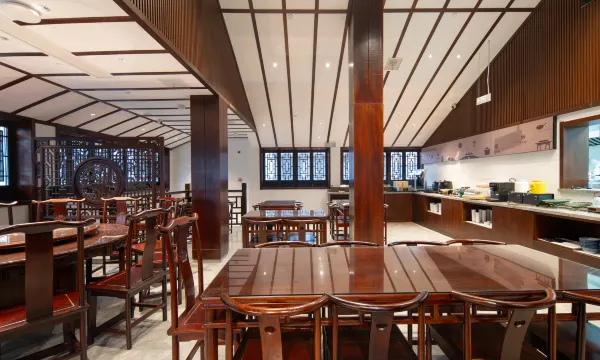
Restaurant
Restaurant
隐陌早茶
Style: Buffet
Cuisine: Chinese
Open for: Breakfast, Afternoon tea
Special dietary options: Vegetarian
Ambience: Family-friendly, Modern, Traditional, Romantic
Dining options: Property guests only, Reservations available
Business hours: [Mon - Sun] 07:00-10:00
More Amenities
Internet
Wi-Fi in public areas
Free
Parking
Private (exclusively for guests) is available On-site parking. Reservation not needed.
Private parking
Free
Car charging facilities
Valet parking
Free
Transportation
Taxi booking service
Business Services
Business center
Postal service
Fax/copying service
Free
Front Desk Services
Tour and ticket booking service
Safe at front desk
Bellhop
Luggage storage
Free
Wake-up call
Concierge service
24-hour front desk
Express check-in and check-out
Lockers available
Electronic ID reader for check-in
Translation tools available
Languages Spoken
English
Chinese (Mandarin)
Italian
Japanese
Korean
Russian
Food & Drink
Cafe
Lobby bar
Public Areas
Shopping mall
No smoking in public areas
Smoking area
Library
Gift shop
PA and sound system
Non-smoking floor
Executive floor
Ventilation system
Humidifier
Garden
Activities
Cardroom
Additional charge
Tea room
Home theater
Close to Animals
Cleaning Services
Laundry service (on-site)
Free
Clothes dryer
Laundry detergent
Clothes steamer
Laundry room
Facilities for Children
Childcare service
Free
Children's meals available
Children's slippers
Children's toothbrushes
Children's toys
Books and videos for kids
Accessibility
Braille signs
Employees proficient with sign language
Stair-free main entrance
Safety & Security
CCTV in public areas
Keycard entry system
Fire extinguisher
Smoke detector
Intruder alarm
Security personnel
Property Policies
Check-in and Check-out Times
Check-in: After 10:00
Check-out: Before 12:00
Front desk hours: 24/7
The property will provide check-in details after booking
If you will arrive outside of check-in hours, contact the property in advance by phone
Guests Accepted
Guests from all countries/regions are welcome at this property
Child Policies
Children of all ages are welcome at this property.
Additional fees may be charged for children using existing beds. Add the number of children to get a more accurate price.
Cribs and Extra Beds
For all room types, cribs and extra beds cannot be added.
Breakfast
TypeChinese
StyleBuffet
Opening hours[Mon - Sun] 07:00-10:00 Open
| Age | Fee |
|---|---|
Children 17 years old and under | Free |
Adult | Buffet:CNY 49.00 (approx. AED 25.02) per person |
Additional breakfast fees are not included in the total and need to be paid at the property.
Deposit Policy
DepositNo deposit required by the property
Pets
Pets are allowedAdditional charge
Types of pets allowed: dogs, cats, other pets (contact the property for details)
Fee: CNY 50.00 (approx. AED 25.53) per room per stay
Service Animals
Service animals are allowed
Age Requirements
The main guest checking in must be at least 18 years old
Paying at the Hotel











- Cash
Property Description
- Opened: 2025
- Number of Rooms: 78
Yinmo Yangzhou · Half-Arshen Garden Hotel: Encounter the Poetic Dwelling of Thousand-Year-Old Yangzhou
"Flowers bloom in March and the Yangtze River flows to Yangzhou." When the poetic charm of spring spreads along the canal, the Hidden Lane Half-Meter Garden Hotel invites you to step into a dream of Jiangnan that transcends time and space. The hotel is rooted in the historical and cultural district north of the Ruan Family Ancestral Hall on Yuxian Street in Guangling District, Yangzhou City. This place was once the residence of Ruan Yuan, a three-time Grand Secretary, a first-rank official, and the Viceroy of Liangjiang during the reigns of Emperors Qianlong, Jiaqing, and Daoguang of the Qing Dynasty.
In the Qing Dynasty's literary circle, there were not many people who could establish a school or a sect. Ruan Yuan from Jiangsu Province was one of them. Ruan Yuan's ancestral home was in Yizheng, Jiangsu Province. He was born in a family of officials in Yangzhou in the 29th year of Emperor Qianlong's reign. His grandfather was a military scholar and served as a general in Hunan. His father entered the imperial academy at a young age and studied "Zuo's Spring and Autumn Annals", becoming a master of classical prose. His mother, Lin, also came from an official family and was well-versed in poetry and literature, with good cultivation. Growing up in such a family, Ruan Yuan was influenced by his family's learning from an early age and gradually became a renowned talent in both literature and martial arts. At the age of 25, Ruan Yuan passed the imperial examination and entered the officialdom. Ruan Yuan not only held high positions but was also a staunch guardian of Yangzhou's culture. He compiled "Jingji Zanggu" and edited and printed "Thirteen Classics with Commentaries and Sub-commentaries", his cultural achievements shining like stars in Yangzhou's cultural heritage.
Mr. Ruan Yuan dedicated his life to cultural inheritance and academic research. The "Jingji Zanggu" he compiled collected the essence of ancient annotations and interpretations, providing an important basis for later generations to study classics. The "Thirteen Classics with Commentaries and Sub-commentaries" he edited and printed, with its rigorous academic attitude in correcting classics, became an important model for the study of classics. The "Huangqing Jingjie" he compiled and printed was a comprehensive collection of Qing Dynasty's research on classics. His academic philosophy of "seeking truth from facts and not believing without evidence" not only influenced the academic atmosphere of an era but also became a shining spiritual treasure in the Chinese cultural heritage.
When children step into this hotel filled with historical charm, every brick under their feet and every painting on the walls tell stories of the past. Wandering through the ancient corridors, gently touching the carved window lattices, they can almost see Ruan Yuan's figure writing at his desk. Standing in front of the pavilions and terraces in the courtyard, feeling the elegance of the blue tiles and horse-head walls, the aesthetic genes of traditional culture are quietly integrated into their cognition.
The hotel has carefully designed nearly a hundred guest rooms, retaining the charm of ancient architecture while integrating intelligent technology. Double-layer vacuum glass windows block out the noise, and voice assistants and electric curtains create a comfortable and convenient living environment for children. The hotel's garden-like design, with its well-arranged pavilions and lush greenery, is a natural classroom for children to explore nature and stimulate their imagination. Here, children can listen to the birds singing in the morning, observe the growth of plants, and gaze at the stars at night, feeling the vastness of the universe. In this way, they develop a love for nature and an exploratory spirit unconsciously.
In addition, the hotel's superior location provides convenience for children's cultural studies. The Renfengli Ancient Street to the east, with its thousand-year-old market life and intangible cultural heritage skills, the nearby Wenchang Pavilion and Siwang Pavilion, which carry the city's memories, and the scenic spots such as Slender West Lake, He Garden, and Ge Garden within a 10-minute drive, perfectly blend the exquisite elegance of Jiangnan gardens with historical stories. Parents can take their children to visit these cultural sites along Ruan Yuan's footsteps, taste traditional delicacies in Dongguan Ancient Street, learn about commercial civilization in salt merchant residences, and appreciate the wisdom of ancient garden design in the gardens, making the knowledge in textbooks come alive.
When young entrepreneurs and professionals step into this renovated ancestral home hotel, it's as if they have traveled through time to have a spiritual dialogue with this great man. The 11 independent ancient-style courtyards, with their black tiles and grey walls, exude the weight of history. The carved beams and painted pillars are engraved with the accumulation of culture. Wandering through them, the overhanging eaves and brackets above seem to reflect Ruan Yuan's broad vision; the winding corridors and paths beneath are like his wisdom in navigating complex situations.
Each guest room in the hotel seamlessly blends traditional aesthetics with modern intelligence. Double-layer vacuum glass windows insulate you from the outside world, creating a quiet space for reflection; the entire house is equipped with smart devices, from voice assistants to smart bathrooms, empowering an efficient lifestyle with technology. And when you open the window, the pavilions, waterside terraces, blooming flowers and lush trees in the courtyard instantly transport you back to the era of scholars and literati discussing poetry and philosophy, allowing you to find a peaceful haven for your soul on the bustling path of striving, and gain clarity on your career direction through contemplation.
The hotel's prime location offers a fertile ground for inspiration and creativity among the younger generation of strivers. To the east lies the bustling Renfengli Ancient Street, where traditional craftsmanship and modern creativity blend harmoniously. To the west is the bustling Wenchang Baihui, where commercial vitality and cultural heritage complement each other. Historical landmarks such as Wenchang Pavilion and Siwangting, within walking distance, bear witness to the thousand-year-old rise and fall of Yangzhou. Within a 10-minute drive are the Slender West Lake, He Garden, and Ge Garden, showcasing the ingenious garden-making wisdom and life philosophy of the ancients. These cultural treasures are like mirrors, reflecting the boundless possibilities of innovative thinking and inspiring you to break conventions and innovate in your career development.
Living in the former residence of Ruan Yuan, you will be immersed in the atmospher